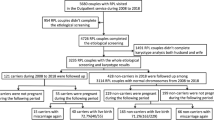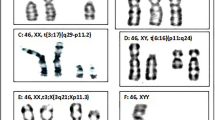Abstract
Recurrent pregnancy loss (RPL) occurs frequently in Chinese patients, but the causes for 40–50% RPL remain unexplained. This study aims to explore possible association between recurrent pregnancy loss and chromosome polymorphism. We performed a retrospective cohort study including a total number of 2967 Chinese patients from January in 2013 to December in 2019.These participants were divided into two groups: group I (RPL group) and group II (control group). Group I included 1791 patients who underwent RPL. Group II included 1176 individuals who underwent primary infertility. Their chromosome karyotype analyses were performed by Giemsa banding protocol. Pearson chi-squared test and Fisher’s exact test were employed to evaluate the difference in frequency of chromosomal polymorphic variations between both groups. Chromosomal polymorphism occurred more frequently in RPL group compared with control group, the differences for 9qh+, inv(9), and Yqh+ between both groups were (χ2 = 6.697, p = 0.01), (χ2 = 6.242, p = 0.012), and (χ2 = 4.587, p = 0.032), respectively. The most significant difference of chromosomal polymorphism karyotype between RPL group and control group was found for acrocentric chromosome (D/G group) variants (χ2 = 30.7, p < 0.001). Moreover, the difference in frequency of D/G group variants between women and men in RPL group was remarkably significant (χ2 = 55.3, p < 0.001), and furthermore, D/G group variants occurred more frequently among women in RPL group than women in control group (χ2 = 44.3, p < 0.001). We found that acrocentric chromosomal polymorphism occurred preferentially on Chinese women with RPL. The fascinating finding provides us novel insight into the potential association of higher frequency of acrocentric chromosomal variations on Chinese women with unexplained RPL.



Similar content being viewed by others
References
American Society for Reproductive Medicine. Evaluation and treatment of recurrent pregnancy loss: a committee opinion. Fertil Steril. 2012;98:1103–11.
ESHRE Pregnancy guideline development group. Recurrent pregnancy loss: guideline of the European Society of Human Reproduction and Embryology. 2017: 1–153.https://www.eshre.eu/Guidelines-and-Legal/Guidelines/Recurrent-pregnancy-loss.aspx. Accessed April 2020.
Zheng DN, Li Ch WT, Tang K. Factors associated with spontaneous abortion: a cross-sectional study of Chinese populations. Reprod Health. 2017;14:33.
Lang J, Zhang B, Meng Y, Du Y, Cui L, Li W. First trimester depression and/or anxiety disorders increase the risk of low birthweight in IVF offspring: a prospective cohort study. Reprod BioMed Online. 2019;39:947–54.
Kolte AM, van Oppenraaij RH, Quenby S, Farquharson RG, Stephenson M, Goddijn M, et al. Non-visualized pregnancy losses are prognostically important for unexplained recurrent miscarriage. Hum Reprod. 2014;29:931–7.
Homer HA. Modern management of recurrent miscarriage. Aust N Z J Obstet Gynaecol. 2019;59:36–44.
Van Dijk MM, Kolte AM, Limpens J, Kirk E, Quenby S, van Wely M, et al. Recurrent pregnancy loss: diagnostic workup after two or three pregnancy losses? A systematic review of the literature and meta-analysis. Hum Reprod Update. 2020;26:356–67.
Ha S, Sundaram R, Buck Louis GM, Nobles C, Seeni I, Sherman S, et al. Ambient air pollution and the risk of pregnancy loss: a prospective cohort study. Fertil Steril. 2018;109:148–53.
Alijotas RJ, Garrido GC. Current concepts and new trends in the diagnosis and management of recurrent miscarriage. Obstet Gynecol Surv. 2013;68:445–66.
Jaslow CR, Carney JL, Kutteh WH. Diagnostic factors identified in 1020 women with two versus three or more recurrent pregnancy losses. Fertil Steril. 2010;93:1234–43.
Minocherhomji S, Athalye AS, Madon PF, Kulkarni D, Uttamchandani SA, Parikh FR. A case-control study identifying chromosomal polymorphic variations as forms of epigenetic alterations associated with the infertility phenotype. Fertil Steril. 2009;92:88–95.
Madon PF, Athalye AS, Parikh FR. Polymorphic variants on chromosomes probably play a significant role in infertility. Reprod BioMed Online. 2005;6:726–32.
Mattei MG, Luciani J. Heterochromatin, from chromosome to protein. Atlas of Genetics and Cytogenetics in Oncology and Haematology. Heterochromatin, from chromosome to protein. 2006:1–8. http://atlasgeneticsoncology.org/Educ/HeterochromEng.pdf. Accessed April 2020.
Šípek A, Mihalová R, Panczak A, Hrčková L, Janashia M, Kaspříková N, et al. Heterochromatin variants in human karyotypes: a possible association with reproductive failure. Reprod BioMed Online. 2014;29:245–50.
Chatzimeletiou K, Taylor J, Marks K, Grudzinskas JG, Handyside AH. Paternal inheritance of a 16qh- polymorphism in a patient with repeated IVF failure. Reprod BioMed Online. 2006;13:864–7.
Sun L, Chen ZH, Yang L, Yi CX, Liu J, Ou CQ. Chromosomal polymorphisms are independently associated with multinucleated embryo formation. J Assist Reprod Genet. 2018;35:149–56.
Liang J, Zhang Y, Yu Y, Sun W, Jing J, Liu R. Effect of chromosomal polymorphisms of different genders on fertilization rate of fresh IVF-ICSI embryo transfer cycles. Reprod BioMed Online. 2014;29:436–44.
Wang Y, Li G, Zuo MZ, Fang JH, Li HR, Quan DD, et al. Y chromosome polymorphisms may contribute to an increased risk of male-induced unexplained recurrent miscarriage. Biosci Rep. 2017;37:1–8.
Karaca Y, Pariltay E, Mardan L, Karaca E, Durmaz A, Durmaz B, et al. Co-occurrences of polymorphic heterochromatin regions of chromosomes and effect on reproductive failure. Reprod Biol. 2020;20:42–7.
Dong Y, Jiang YT, Du RC, Zhang HG, Li LL, Liu RZ. Impact of chromosomal heteromorphisms on reproductive failure and analysis of 38 heteromorphic pedigrees in Northeast China. J Assist Reprod Genet. 2013;30:275–81.
Practice Committee of the American Society for Reproductive Medicine. Definition of infertility and recurrent pregnancy loss: a committee opinion. Fertil Steril. 2013;99:63.
Shaffer LG, Slovak ML, Campbell LJ, International Software Consulting Network (ISCN). An international system for human cytogenetic nomenclature. Karger. Basel. 2009;2009:53–4.
Liehr T. Cytogenetically visible copy number variations (CG-CNVs) in banding and molecular cytogenetics of human; about heteromorphisms and euchromatic variants. Mol Cytogenet. 2016;9:5.
Lin CY, Shukla A, Grady JP, Fink JL, Dray E, Duijf PHG. Translocation breakpoints preferentially occur in euchromatin and acrocentric chromosomes. Cancers. 2018;10:13.
Cockwell AE, Jacaops PA, Beal SJ, Crolla JA. A study of cryptic terminal chromosome rearrangements in recurrent miscarriage couples detects unsuspected acrocentric pericentromeric abnormalities. Hum Genet. 2003;112(3):298–302.
Van Jaarsveld RH, Kops GJPL. Difference makers: chromosomal instability versus aneuploidy in cancer. Trends Cancer. 2016;2:561–71.
Starke H, Seidel J, Henn W, Reichardt S, Volleth M, Stumm M, et al. Homologous sequences at human chromosome 9 bands p12 and q13-21.1 are involved in different patterns of pericentric rearrangements. Eur J Hum Genet. 2002;10:790–800.
Humphray SJ, Oliver K, Hunt AR, Plumb RW, Loveland JE, Howe KL, et al. DNA sequence and analysis of human chromosome 9. Nature. 2004;429:369–74.
Jolly C, Metz A, Govin J, Vigneron M, Turner BM, Khochbin S, et al. Stress-induced transcription of satellite III repeats. J Cell Biol. 2004;164:25–33.
Amiel A, Sardos-Albertini F, Fejgin MD, Sharony R, Diukman R, Bartoov B. Interchromosomal effect leading to an increase in aneuploidy in sperm nuclei in a man heterozygous for pericentric inversion (inv 9) and C-heterochromatin. J Hum Genet. 2001;46:245–50.
Xiao Z, Zhou X, Xu W, Yang J. A preliminary study of the relationship between the long arm of the Y chromosome (Yqh+) and reproductive outcomes in IVF/ICSI-ET. Eur J Obstet Gynecol Reprod Biol. 2012;165:57–60.
Navarro-Costa P, Plancha CE. Heterochromatin: the hidden epigenetic geography of the Y chromosome. Hum Reprod Update. 2011;17:434.
Krausz C, Hoefsloot L, Simoni M, Tüttelmann F. EAA/EMQN best practice guidelines for molecular diagnosis of Y-chromosomal microdeletions: state-of-the-art 2013. Andrology. 2014;2:5–19.
Nie H, Lu G, Long Y. Chromosome is not a fetal loss risk. J Assist Reprod Genet. 2011;28:151–6.
Zhou R, Cheng J, Ma D, Tan J, Wang Y, Hu P, et al. Identifying novel copy number variants in azoospermia factor regions and evaluating their effects on spermatogenic impairment. Front Genet. 2019;10:427.
Author information
Authors and Affiliations
Corresponding author
Additional information
Publisher’s Note
Springer Nature remains neutral with regard to jurisdictional claims in published maps and institutional affiliations.
Electronic supplementary material
ESM 1
(DOCX 15 kb).
Rights and permissions
About this article
Cite this article
Feng, X., Liu, J., Wang, Y. et al. Acrocentric Chromosome Polymorphic Variants on Chinese Female Have Possible Association with Unexplained Recurrent Pregnancy Loss. Reprod. Sci. 28, 575–584 (2021). https://doi.org/10.1007/s43032-020-00332-1
Received:
Accepted:
Published:
Issue Date:
DOI: https://doi.org/10.1007/s43032-020-00332-1




